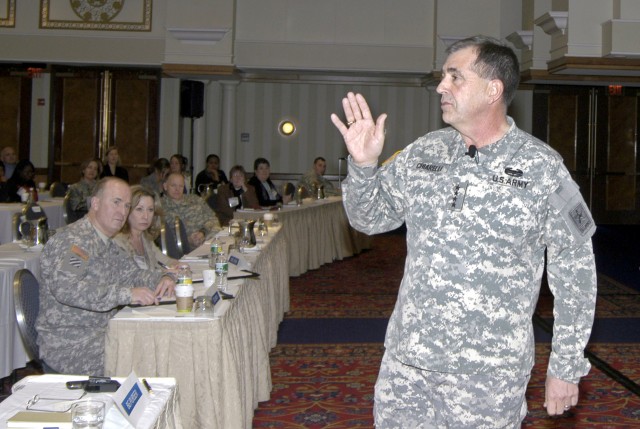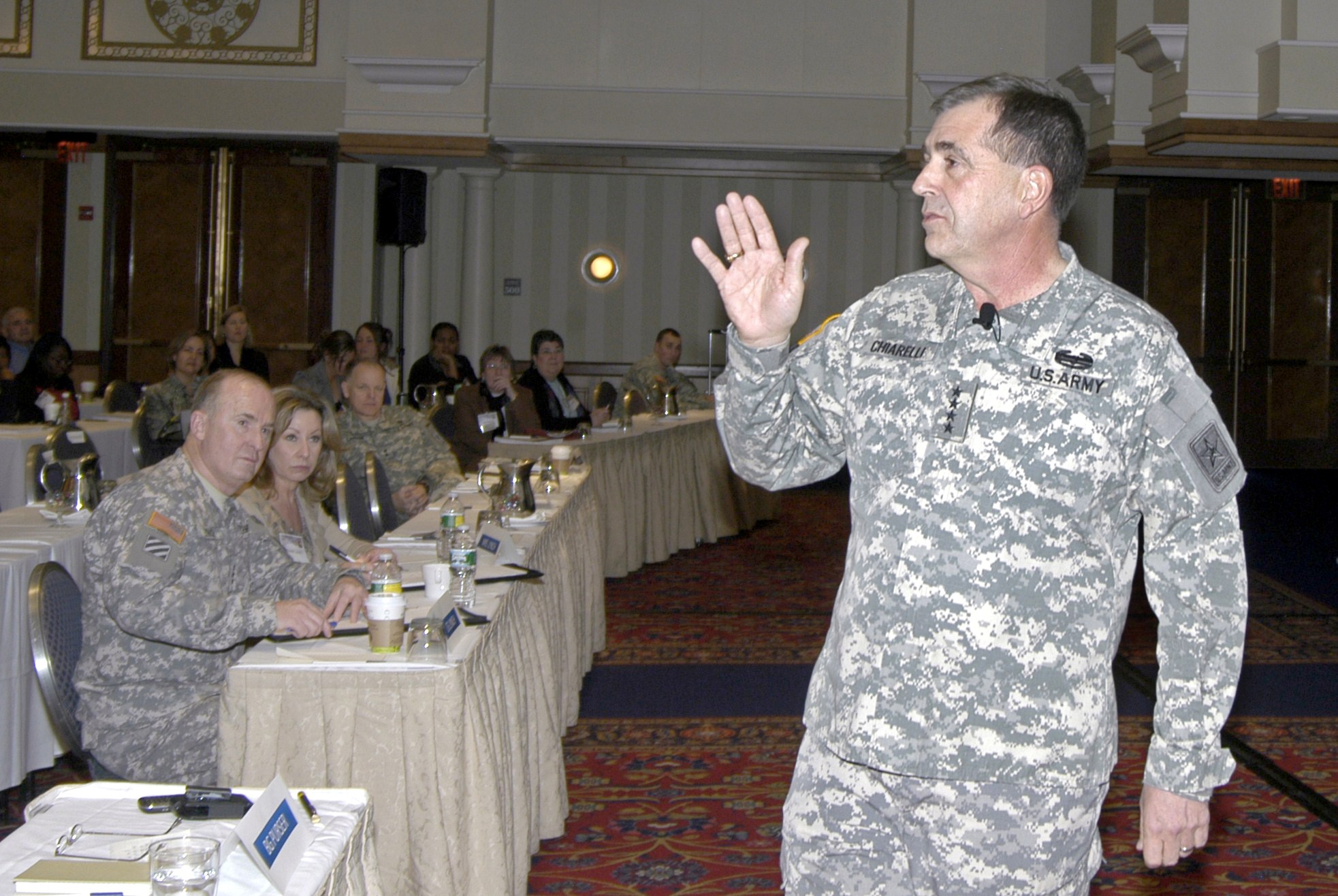ARLINGTON, Va. (Jan. 12, 2009) -- Looking to tackle problems that impact communities throughout the service, some 350 delegates are gathering this week for the Army Family Action Plan conference.
The AFAP is an intensive, week-long event where delegates from across the Army meet to discuss 82 quality-of-life issues originating at the installation level throughout the past year.
Accordingly, workgroup managers, family members and friends arrived in the nation's capital during the weekend to begin their working group sessions. Also in attendance are delegates that make up the AFAP Teen Panel - and through their unique perspective, they will present the top three issues that impact military youth. The young adults are from Youth Leadership Forums at Army garrisons in seven regions and throughout the Army National Guard, Army Reserve, and Accessions Command.
Their valuable insight is needed because, "We are a nation at war and the impact on our families is almost insurmountable, said Lt. Gen. Rick Lynch, commanding general of Installation Management Command and Assistant Chief of Installation Management. "Our Soldiers realize their mission, but I lose sleep at night when I think about the stress and strain on families. We cannot allow families to break."
Since the first signing of the Army Family Covenant in 2007, Army leaders have made a commitment to improving family readiness by standardizing and funding existing family programs and services; by increasing accessibility and quality of health care; by ensuring excellence in schools, youth services and childcare; by improving Soldier and family housing; and by providing Soldiers and families a quality of life that is commensurate with their service.
Although the commitment remains strong, the Army has had to reduce the amount of money needed to ensure these programs continue.
"We have less money than we had last year. But I'm convinced we can still achieve our goals," Lynch said.
"We have to ask ourselves, 'are we doing the right thing,' but also, 'are we doing things right'' If things about a program make no sense, we need your support to change," Lynch said.
During the past 26 years, since AFAP initiated its first conference, family members never had a problem speaking up about the quality of programs; they were never afraid to help senior leaders find appropriate solutions, leaders such as Gen. Peter Chiarelli, the vice chief of staff of the Army. Immediately following a brief presentation Monday on Post Traumatic Stress Disorder, commonly known as PTSD, delegates used the general's question-and-answer period to begin addressing their issues.
One Army spouse asked about the Reserve and National Guard having the ability to attend the Strong Bonds program. She said her husband wasn't able to schedule a class because his commander wouldn't allow him to miss his work assignment. Chiarelli called up Maj. Gen. Douglas Carver, the Army's chief of chaplains, and Chaplain Lt. Col. Strom to help provide information. This issue is one of many discussed at the General Officer Steering Committee meeting.
Kellie Hanson from Fort Hood, Texas, asked why the rest of the Army can't do what Fort Hood, Texas, has been able to do, to which she received a resounding applause.
Lynch, when he was the commanding general at Fort Hood, directed his Soldiers to leave work at 6 p.m., allowing them to be home for dinner with their families. He also enforced the rule that Soldiers must leave work at 3 p.m. on Thursdays and could not work weekends unless he personally approved it.
Fort Leavenworth, noted Chiarelli, has a similar program. The vice chief of staff told Hanson he has asked his commanders to review the good things happening at Fort Hood and Fort Leavenworth to see if they could implement these programs within their units. As long as each garrison commander can arrive at a solution that meets their unique needs, he believes this can happen.
Another participant asked Chiarelli if her brother - a veteran and in need of behavioral health treatment - could do anything about speeding up his access to care at the Veterans Administration Medical Center. The general asked her to speak in depth with him later during a reception.
All total, the delegates have 82 issues before them and a mission to pare them to the top 16 by Wednesday. By Friday, they must deliver the top five issues for presentation to Army senior leaders.
"This is how we get at all these issues facing our families, so thank you very, very much," Lynch said.
AFAP was created in 1980 through focus groups, but was fully developed with the first official AFAP Conference held July 1983. Overall, its mission is to help Army leaders address the needs and concerns of the total Army family.
After representatives across the Army identify issues that will improve the standard of living for Soldiers and families, Army leaders provide policy changes that become tangible end products for the Army family, including Soldiers, retirees, civilian employees and family members.
In the 25 years that AFAP has been operating, 651 issues have been adopted and have resulted in 112 changes to legislation, 159 changes to Department of Defense and Army policy, and 178 improvements to programs and services.
AFAP remains the preeminent means for commanders, at all levels, to seek solutions to the concerns of their communities.


Social Sharing